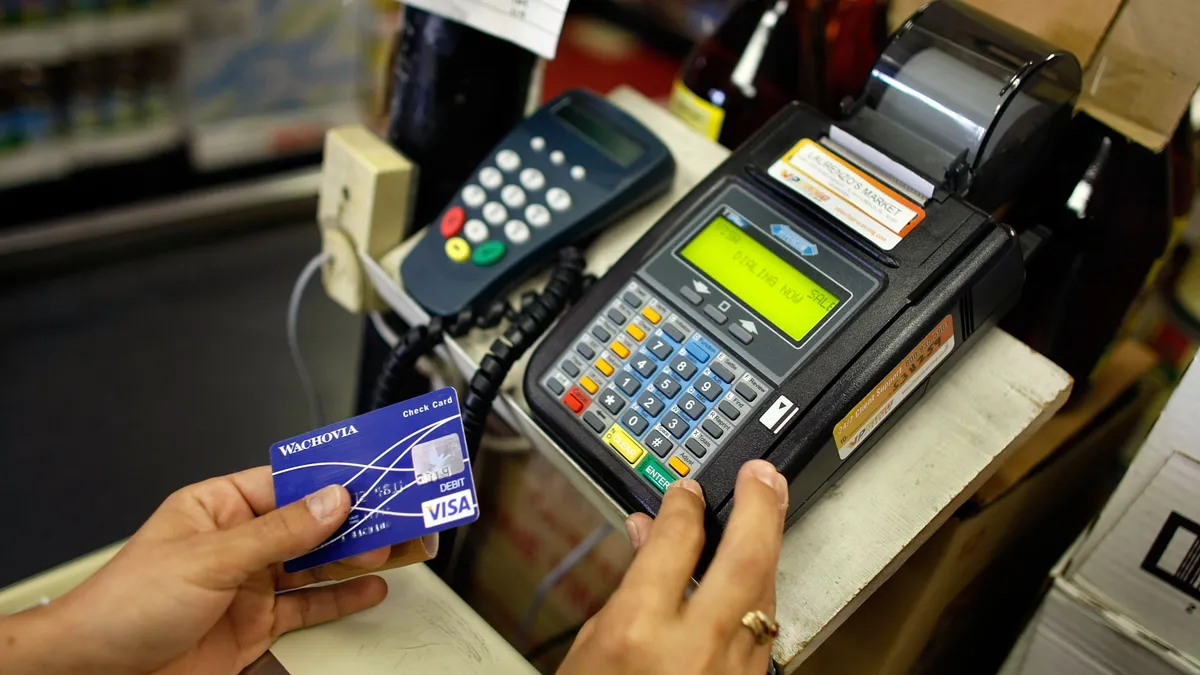Mastercard’s entrance into China’s domestic market will further reveal whether that gigantic consumer market is a huge win for U.S.-based card companies, or an ultimate loss.
Mastercard said Monday that its Mastercard NUCC Information Technology joint venture with a Chinese entity had won approval from the country’s central bank, the People’s Bank of China, to clear payments domestically and offer card services in yuan-denominated transactions.
U.S.-based card companies have been angling since at least 2017, with help from the U.S. government, to gain entry to the domestic market, in the hopes of attracting Chinese banks and consumers to their services. Offering such services would supplement and complement the U.S. card companies existing cross-border services flowing through China.
The debit and credit market in China is valued at $17 trillion annually, according to a Monday report from analysts at the financial firm Robert W. Baird. That’s mainly by virtue of China being the second-largest country in the world after India, based on population, with the second-biggest economy, behind the U.S.
Nonetheless, American card companies will have to do battle with the dominant government-backed China UnionPay to win business, specifically by attracting Chinese banks as card issuers.
“UnionPay is the 800-pound gorilla in that market,” said David Robertson, whose The Nilson Report provides card market research. But there will be plenty of opportunities for U.S.-based companies to gain market share, he predicts. “I’m not saying that UnionPay is sweating bullets here — it’s just that the opportunity is so big.”
That said, China’s government hasn’t been quick to let in competition. While China gave American Express approval to operate in the country before Mastercard, back in 2020, Visa has yet to gain the same permission despite efforts to do so. Spokespeople for San Francisco-based Visa and Purchase, New York-based Mastercard didn’t respond to requests seeking additional comment on their efforts.
How U.S. companies could compete
Aside from offering credit card services, Visa and Mastercard could help Chinese banks compete on the digital front with the widespread use of digital wallets in China, namely Alibaba Group’s Alipay and Tencent’s WeChat, Robertson said Monday in an interview.
Pricing would also likely play into the tactics on the battleground. “There will be ways in which the new kid on the block will have to be competitive,” Robertson said. “Price will be one.”
Visa and Mastercard are likely to wade into the market by partnering with Chinese banks to offer limited credit services at first, like co-branded cards, predicted Baird analyst David Koning, who follows the companies. Still, there is no guarantee that the government-backed banks will want to tap them for card-issuing or network services.
China’s banks may opt not to do business with the U.S. companies, Koning said. That’s despite the notion that they could benefit from U.S. companies’ experience with respect to fraud protection services and reward programs, he added in an interview Monday.
Baird analysts seconded that possibility in a Monday note to their clients. “We believe that even if [Visa and Mastercard] are allowed to enter, it's possible that many Chinese issuers could decide not to use them,” the analysts said.
Amex experience in China
Although American Express gained entry to China’s domestic market several years ago, Koning said it’s not clear whether it’s winning any business. A spokesperson for New York-based Amex didn’t immediately respond to a request for comment.
And Amex, which is both an issuer and network, has emphasized expanding its debit card business in China, though it has issued some.
Amex tucks its revenue from its joint venture in China into its global merchant and network services business segment, and that has been on the rise. Its revenue, less interest expense, jumped 26% last year, over 2021, to nearly $6.5 billion, according to its annual filing with the Securities and Exchange Commission this year.
“To the extent we expand into, or further grow in, new business areas and new geographic regions, such as mainland China, we will face competitors with more experience and more established relationships with relevant customers, regulators and industry participants, which could adversely affect our ability to compete,” Amex said in the filing.
In discussing joint ventures in other countries, Amex also warned in the filing that there are higher risks because of less control over the operations.
How the Chinese government-backed entities might handle card customer data or corporate trade secrets remains a dicey open question, Koning noted. He pointed to the turmoil that ensued when Russia invaded Ukraine in 2022, forcing the U.S. card companies to shut down operations. If China were to try to take over Taiwan, it could trigger a similar situation, he said.
Still, the American card companies aren’t likely to be formidable competitors anytime soon, given the track record on winning approvals in the country and based on similar experiences elsewhere.
“These kinds of deals take a long time to come to fruition,” Robertson noted. “People have to get to know each other and trust each other.”
“These are slow-moving processes,” he said.



















